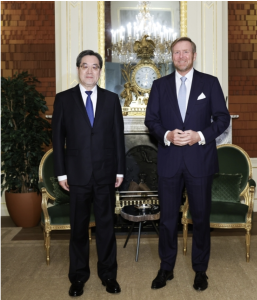Chinese Vice Premier Ding Xuexiang has visited the Netherlands. He was received at the highest level, meeting with King Willem-Alexander, Prime Minister Schoof, and the Ministers of Foreign Affairs and Climate and Green Growth. This was an extensive welcome, additionally, Minister Klever of Foreign Trade and Development Cooperation also held discussions with Vice Minister of Commerce Wang Shouwen.
Ding is the highest-ranking Chinese Communist Party official to visit the Netherlands since the late former Premier Li Keqiang’s visit in 2018. According to Dutch spokespersons, discussions over the past two days covered geopolitical developments such as the war in Ukraine, as well as cooperation on issues like climate, trade, and health.
Ding’s visit comes at a time when Dutch-Chinese relations are under strain. In December 2024, the Dutch National Coordinator for Counterterrorism and Security (NCTV) released a report designating China as a “systemic rival to the West, posing a hybrid threat.” A Dutch parliamentary debate on future China policy, originally scheduled for December 2024, was postponed to February 2025. In preparation, Foreign Minister Veldkamp acknowledged that relations with China are increasingly defined by competition, rivalry, and national security risks. Dutch company ASML, the global leader in semiconductor lithography machines, is crucial for modern technologies such as AI, 5G, and advanced military systems. Ding’s visit aims to ease Dutch concerns and expand cooperation.
Despite competition, China remains a key partner for the Netherlands in climate policy. While China is the world’s largest emitter of greenhouse gases—twice the emissions of the US—it is also the global leader in renewable energy.
In 2024, China installed more solar and wind energy capacity than the entire European Union combined. This has brought China closer to a tipping point, where its massive emissions are expected to decline in the near future.
Political reporter Michiel Breedveld stated: “Ding’s visit comes at a strategic moment, especially after former US President Trump withdrew from the Paris Climate Agreement, weakening US influence in green technology. China sees an opportunity to strengthen its leadership in this area.
The Netherlands, and the EU in general, are crucial partners. Like the EU, China heavily relies on foreign oil and gas. Developing renewable energy helps both China and Europe become more energy-independent.
However, this cooperation also increases the EU’s dependence on China, which unfairly competes with European industries through state subsidies. This is why the EU has imposed tariffs on Chinese electric vehicles. Beijing hopes to prevent similar restrictions on other products, a key topic in Ding’s discussions with Climate Minister Hermans.

Source: NOS Nieuws
